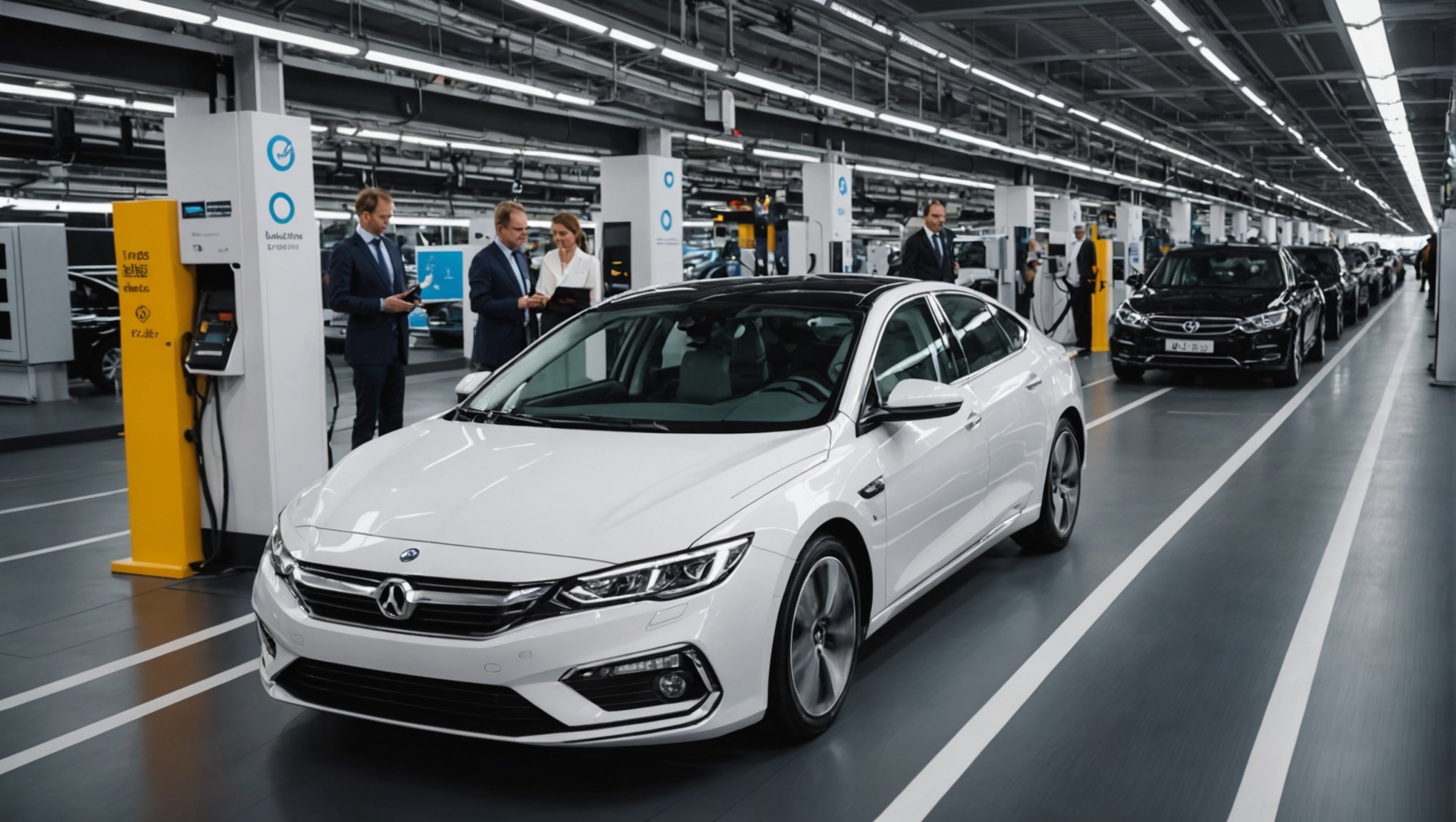Automotive innovation is rapidly evolving towards sustainable solutions that promise to reshape transportation. Electric vehicles lead the charge, but advancements in smart technology, battery efficiency, and alternative fuels also play crucial roles in this transformation. Manufacturers are prioritizing not only eco-friendly options but also enhancing user experience through connectivity and automation. Explore the latest trends driving the industry toward a sustainable future and discover how these developments impact our daily lives and the environment.
Overview of Automotive Technology Trends
In recent years, automotive technology has seen remarkable advancements, fundamentally transforming the industry. One significant trend is the integration of electric vehicles (EVs), which are spearheading the movement towards sustainability. These vehicles not only reduce emissions but also promote energy efficiency, aligning with global environmental goals.
In parallel : The Latest Trends in Automotive Technology to Stay Ahead of the Curve
Another pivotal development is the rise of autonomous driving technology. This innovation promises to enhance safety and convenience, reducing human error and potentially lowering accident rates. Moreover, connected car technologies are gaining traction, offering enhanced communication between vehicles and infrastructure, thereby improving traffic management and reducing congestion.
The role of technology in promoting sustainability extends beyond EVs. Innovations in materials, such as lightweight composites, are contributing to more efficient fuel consumption. Additionally, advancements in battery technology are crucial for extending the range and lifespan of electric vehicles, making them more viable for widespread adoption.
Have you seen this : Top Innovations in Car Manufacturing to Stay Ahead of the Curve
Key industry players, including Tesla, Toyota, and Ford, are at the forefront of these innovations. They are investing heavily in research and development to push the boundaries of what is possible in automotive technology. As these trends continue to evolve, the industry is poised for a future where innovation and sustainability go hand in hand.
Electric Vehicles and Their Impact on Sustainability
The electric vehicle (EV) market is experiencing rapid growth, driven by the increasing need for sustainable transportation solutions. With the global push towards reducing carbon footprints, EVs are becoming a cornerstone in efforts to lower emissions. These vehicles are designed to produce zero tailpipe emissions, significantly cutting down on pollutants that contribute to climate change.
Innovations in Battery Technology
A critical factor in the rise of EVs is the advancement in battery technology. Modern batteries are not only more energy-efficient but also have extended ranges, making electric vehicles more practical for everyday use. Innovations such as solid-state batteries promise even greater efficiency and longevity, addressing one of the main concerns of potential EV adopters: range anxiety.
Environmental Benefits
The environmental benefits of electric vehicles extend beyond emissions reduction. By eliminating the need for fossil fuels, EVs help decrease dependency on non-renewable energy sources. This shift supports global efforts to promote renewable energy and reduce greenhouse gas emissions. Additionally, the production of EVs is becoming more sustainable, with manufacturers focusing on eco-friendly materials and processes.
In summary, electric vehicles play a pivotal role in promoting sustainability, with advancements in battery technology and energy efficiency driving their adoption and environmental impact.
Renewable Energy Integration in Automotive Manufacturing
In the evolving landscape of automotive technology, the integration of renewable energy in manufacturing processes is gaining momentum. Automotive companies are increasingly adopting renewable energy sources, such as solar and wind power, to minimise their carbon footprint and promote eco-friendly manufacturing.
Several manufacturers have set benchmarks with their sustainable practices. For instance, BMW has incorporated wind turbines at their Leipzig plant, generating a significant portion of their energy needs. Similarly, Tesla’s Gigafactory in Nevada aims to be powered entirely by renewable energy, showcasing a commitment to sustainable practices.
The adoption of renewable energy has a two-fold impact on the industry. Firstly, it reduces production costs over time. By utilising natural resources, companies can cut down on energy expenses, making the manufacturing process more economical. Secondly, it significantly lowers emissions, aligning with global environmental goals and enhancing the company’s green credentials.
Sustainable practices in manufacturing not only benefit the environment but also appeal to eco-conscious consumers. As more companies embrace renewable energy, the automotive industry moves closer to a future where sustainability is at the core of its operations. This shift is essential for reducing the industry's overall environmental impact.
Government Regulations and Policies Promoting Sustainable Automotive Practices
The automotive industry is significantly influenced by government regulations and automotive policies aimed at promoting sustainability. These regulations set environmental standards that manufacturers must adhere to, driving the industry towards more eco-friendly practices.
Overview of Current Regulations
Current government regulations focus on reducing emissions and improving fuel efficiency. For example, the European Union's stringent CO2 emission targets require car manufacturers to significantly cut emissions from their fleets. Similarly, in the United States, the Corporate Average Fuel Economy (CAFE) standards mandate improvements in the average fuel economy of vehicles.
Government Initiatives Promoting Sustainability
Various government initiatives are in place to encourage sustainable practices in the automotive sector. Incentives such as tax credits and subsidies for electric vehicle adoption are common. Additionally, investments in charging infrastructure and research grants for developing green technologies are crucial components of these initiatives.
Impact on Consumer Behavior and Industry Trends
These environmental standards and policies influence consumer behavior by making sustainable vehicles more attractive and affordable. As a result, there is a noticeable shift towards electric and hybrid vehicles. Moreover, automotive companies are investing heavily in research and development to meet regulatory demands, shaping industry trends towards sustainability.
Consumer Trends and Preferences Towards Sustainable Vehicles
Consumer behavior is increasingly leaning towards sustainable vehicles as environmental awareness grows. Recent market trends reveal a significant shift in preferences, with eco-friendly vehicles gaining popularity. This change is driven by a combination of factors, including heightened environmental consciousness and the desire for cost-effective transportation solutions.
Market research indicates a rising demand for sustainable automotive solutions. Consumers are prioritising vehicles that offer lower emissions and better fuel efficiency. This trend is evident in the increased sales of electric and hybrid vehicles, which are perceived as more environmentally friendly options.
Social media plays a pivotal role in shaping consumer choices. Platforms like Instagram and Twitter amplify awareness about the benefits of sustainable vehicles, influencing public perception and driving demand. Influencers and environmental advocates use these channels to highlight the advantages of eco-friendly transportation, further swaying consumer behavior.
In summary, the market for sustainable vehicles is expanding as consumer preferences evolve. This shift is supported by growing awareness and the influence of social media, which together foster a more environmentally conscious approach to automotive choices. As such, manufacturers are increasingly focusing on developing vehicles that align with these preferences, ensuring they remain competitive in a changing market.
Eco-Friendly Materials and Manufacturing Processes
In the quest for sustainability, the automotive industry is increasingly focusing on eco-friendly materials and sustainable manufacturing processes. These efforts are transforming traditional automotive design, ensuring that vehicles are not only efficient but also environmentally responsible.
Innovations in materials are at the forefront of this transformation. Manufacturers are exploring alternatives like bioplastics, recycled metals, and natural fibres, which reduce the environmental impact of production. These materials offer the dual benefits of being lightweight, which improves fuel efficiency, and reducing reliance on non-renewable resources.
Sustainable design practices are integral to modern automotive engineering. Designers are adopting approaches that minimise waste and optimise resource use throughout the vehicle's lifecycle. This includes strategies like modular design, which allows for easier disassembly and recycling of parts, and the use of renewable energy in production facilities.
The importance of lifecycle assessment cannot be overstated. This comprehensive evaluation considers the environmental impact of a vehicle from production to disposal. By assessing factors such as energy consumption, emissions, and resource use, manufacturers can identify areas for improvement and develop strategies to enhance sustainability. This holistic approach is essential for creating truly sustainable vehicles.
Future Predictions for Sustainable Automotive Technology
The future of automotive technology is brimming with possibilities, particularly in the realm of sustainability. Experts predict that future trends will see electric and hybrid vehicles becoming even more efficient and accessible. As battery technology continues to advance, these vehicles are expected to offer longer ranges and quicker charging times, addressing current limitations and enhancing their appeal.
Autonomous vehicles are also poised to play a significant role in the sustainability vision. By optimising driving patterns and reducing congestion, these vehicles can significantly cut emissions. The potential for autonomous vehicles to operate in fleets could further enhance their environmental benefits by maximising efficiency and reducing the number of cars on the road.
Expert opinions suggest that the integration of renewable energy sources within vehicle systems will be a game-changer. Solar panels and other renewable technologies could soon become standard, powering not just the vehicle itself but also contributing to the grid.
In summary, the sustainability vision for automotive technology is not just about reducing emissions but also about creating a holistic system where vehicles are part of a larger, eco-friendly network. The coming years promise exciting advancements that could redefine transportation as we know it.
The Environmental Impact of Automotive Technologies
The environmental impact of automotive technologies is a critical area of focus as the industry evolves. As new technologies emerge, it's essential to assess their overall effect on the environment and how they contribute to the industry's carbon footprint.
Sustainability metrics play a vital role in this evaluation. These metrics include emissions generated during production and operation, energy consumption, and resource utilization. By analyzing these factors, manufacturers can identify areas for improvement and implement strategies to minimize negative environmental effects. For instance, lifecycle assessments provide insights into a vehicle's total environmental impact from production to disposal, offering a comprehensive view of sustainability.
Strategies for reducing the carbon footprint include adopting sustainable materials and optimizing manufacturing processes. Lightweight materials, such as composites and recycled metals, enhance fuel efficiency and reduce emissions. Additionally, integrating renewable energy sources in production facilities can significantly lower energy consumption and emissions.
Technological advancements also offer solutions. For example, electric vehicles (EVs) eliminate tailpipe emissions, directly reducing pollutants. Autonomous driving technologies can optimize driving patterns, decreasing fuel consumption and emissions. Through these innovations, the automotive industry can continue to advance while prioritizing environmental sustainability.
















